
When we think of casino activities, the initial pictures that frequently cross our minds are those of spinning roulette wheels, card tokens clinking on fabric tables, and dice rolling across a gaming area. While numerous consider these games as simple hobbies fueled by chance, a more profound exploration reveals a fascinating blend of strategy, skill, and social interaction that raises them far beyond simple chance. Regardless of whether you are a seasoned player or a curious newcomer, understanding the subtleties of these games can greatly enhance your enjoyment and appreciation.
Casino activities have evolved over hundreds of years, with different cultures contributing to their rich backgrounds and variations. From the intricate strategies of blackjack to the deception methods in card games, players engage in a battle of intellect as much as a risk on odds. This dynamic interplay between luck and skill creates a thrilling atmosphere that draws millions to casinos worldwide. As we delve into the world of card activities, we will reveal the methods that can shift the odds in your favor and the social elements that make these activities a popular choice for entertainment and interaction.
The Strategy Behind Casino Games
Casino games often involve a blend of ability and chance, which makes them intriguing for players who like a test. Every game has their unique set of guidelines and tactics that can affect the outcome. For example, in titles like blackjack, players are obliged to use strategies like counting cards and grasping the probabilities to make informed decisions. This skill set can significantly improve the winning potential, distinguishing experienced players from beginners who may rely solely on luck.
Conversely, titles such as the roulette may appear to be entirely based on chance, but tactical thinking can also come into play. Participants can select between various betting strategies, such as the Martingale system, where they increase their bets after a loss. This method can create a more controlled approach to the game. Grasping the odds of specific bets can also help players make better decisions on the roulette table, demonstrating that even titles of chance, strategy can enhance the enjoyment.
Additionally, the game of poker is notable as a game that heavily emphasizes tactics. In contrast to most gaming games, the game of poker merges skill, mental acuity, and luck. Participants must also focus on the hands they are dealt but also take into account their opponents behavior and betting patterns. Mastering concepts like table position, the odds of the pot, and interpreting bluffs is essential for winning. This depth of strategy in the game of poker often leads to a more engaging experience for participants, where the decisions and abilities greatly impact the match’s outcome.
Understanding Probability and Ratios
In the realm of gambling activities, likelihood and odds hold a critical role in determining a player’s possible consequences. Every activity has its own set of guidelines that define how the chance of winning or failing is measured. For example, in matches like 21, participants have a chance to affect their ratios through tactics, whereas in matches like roulette, the outcomes are entirely dictated by chance. Comprehending how these probabilities are calculated can significantly affect how a player tackles the match.
Ratios are typically expressed in two forms: ratio and decimal. Fractional ratios indicate the proportion of the sum won to the sum bet, whereas decimal ratios show the overall payout for a winning wager, which includes the stake. For instance, if a game has odds of 5 to 1, this implies that for every one dollar bet, a player could gain five units if successful. Knowing how to read these odds allows players to assess their potential winnings and make more educated decisions during gameplay.
Players should also be aware of the house edge, which is the casino’s inherent advantage over the players. Each match has a different house edge, and understanding this concept is essential for handling one’s hopes and funds. Activities with a reduced house edge, such as blackjack and baccarat, typically offer superior odds for gamblers compared to activities like slot machines and keno. By recognizing the connection between probability, odds, and the casino advantage, players can enhance their gambling engagement and strategize more effectively.
The Aspect of Casino Table Games
Table games at casinos are often seen as a hub of social interaction, bringing players together in a collective experience that extends far past the mere act of gambling. The atmosphere at a blackjack table can be vibrant, with gamblers engaging not only with the game itself but also with one another. Laughter, cheers, and, sometimes, playful teasing create connections that enhance the overall experience of the gaming experience. This communal aspect can turn a solitary endeavor into a lively social event, making table games particularly enticing.
One of the fascinating elements of gaming at tables is the way it fosters camaraderie among participants. Whether it’s teaming up to beat the dealer at a dice table or sharing stories between hands in a card game, the environment encourages interaction. Players often share tips or strategies, creating a sense of community that boosts the fun. This social dynamic can make new players feel included and less daunted by the competitive nature of gaming. As the game progresses, friendships may form, leading to a sense of connection that keeps players coming back to the table.
Moreover, the social aspect of gaming at tables extends outside just the participants. Dealers play a vital role in encouraging interaction and maintaining the flow of the game. nohuwin Their ability to engage gamblers with friendly conversation and their expertise in running the table can create an welcoming atmosphere. This connection between players and staff adds another layer of enjoyment, where gamblers feel connected not only to each other but also to the staff. Such interactions are often what make the experience unforgettable, as participants leave with stories to tell and connections made, reinforcing the notion that table games are truly about something greater than luck.